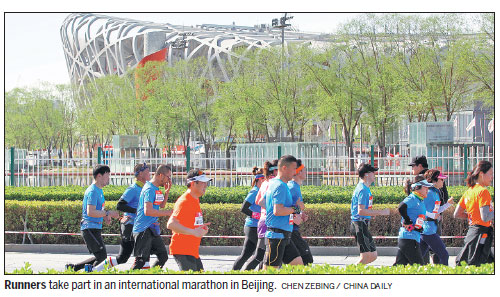Sport injects new vigor into urban development
Beijing's continuing ability to stage top-flight international sports events is a boon to the city's tourism, officials and academics at a forum on sports-themed leisure said.
Sports events are increasingly serving as a new engine to power the growth of cities, said Sun Haibin, a professor at Beijing Sport University. Competitions such as the Olympics have improved local organizers' expertise and promoted the sports industry, Sun said.
Beijing, which in 2022 will become the only city in the world to hold the Summer and Winter Olympics, will play host to the World Leisure Congress in 2020.
"The congress will bring fundamental changes to Beijing and nearby regions, overturning people's concept of leisure," said Ling Ping, executive director of the World Leisure Organization.
Sports events can help host cities to establish a brand, Sun said. Based on intellectual property generated by sports events, the cities can also create more related activities, such as competition training, and build outdoor sports centers.
Liang Xiaolong, former director of the sports culture development center at the General Administration of Sport of China, said: "Leisure sports will be the biggest sector in the sports market."
Diversified leisure activities require the development of the sports industry, Liang said, adding that the government should regulate the market, and its supervision should follow the development rules of the sports industry.
Zhang Jian, dean of the School of Leisure Sports and Tourism at Beijing Sport University, said: "The development of the leisure sports industry requires improvements from the prospective of sporting projects, government, operation modes and industrial patterns."
There is strong demand for sporting leisure in China, and the country is rich in natural resources to develop the industry, but how properly to use those resources to satisfy the booming market is problematic, Zhang said.
He called for the sports industry to draw on cultural, historic and regional advantages.
The industry also needs training centers to be built and sports travel itineraries to be established, he said.
Li Xiangru, a professor at Capital University of Physical Education and Sports, said that a city is the carrier of sports, and sports must be the source of people's vitality.
In a city, people's sportsmanship and achievements reflect their spirit and attitude, Li said.
"The Olympics and the marathon held in Beijing have become the city's two business cards to the world," he said.
As a city grows, sports can provide activities to its citizens that help them lead more enjoyable lives, Li said.

(China Daily 09/28/2018 page10)














